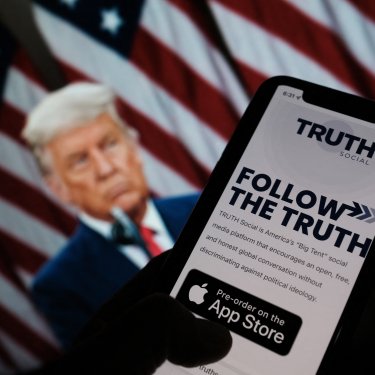United States: “Truth Social” highlights need for politically and ideologically neutral social media platforms

Former US President Donald Trump has launched “Truth Social,” a social media platform that is open about its desire to bring together those who share its founder’s values. While it is perfectly legitimate for media outlets to defend and promote a position, the digital platforms and social media that shape and structure the online public arena should be required to observe political, ideological and religious neutrality.
The newest of the world’s social media, scheduled to become fully operational in the United States by the end of the month, Donald Trump’s Truth Social is clearly intended to serve a political position and therefore alarms Reporters Without Borders (RSF), which is concerned about the dangers of digital platform and social media bias.
RSF wants all online platforms and social media to be obliged to observe political, ideological and religious neutrality, as defined in article 26 of the International Partnership on Information and Democracy, which was created as a result of an RSF initiative and which 45 governments have so far joined. Everyone should be free to say what they want in the online public arena, but the public arena’s architecture should itself be free of bias. This is an essential pre-requisite for a democratic information arena.
The invasion of the Capitol on 6 January 2021 by Trump supporters who had been radicalised by Parler, a social networking service founded by a Trump ally, constitutes a disturbing precedent. It shows that feeding citizens ideologically biased news and information poses a serious danger for democracy. But this is the road that Trump has chosen to take with Truth Social. Trump Media & Technology Group, its creator, said in a press release last October that its goal was to “create a rival to the liberal media consortium” – “liberal” here meaning “pro-Democratic Party” – and to stand up to the Big Tech companies that have “used their unilateral power to silence opposing voices in America.” The slogan “Canceling Cancel Culture” is displayed prominently on the company’s homepage.
“This is a trend that we have been seeing lately,” said Vincent Berthier, the head of RSF’s Tech Desk. “This kind of platform offers Internet users the possibility of joining a homogeneous community of people who think like them. Truth Social’s statements present Donald Trump as the community’s big attraction, which gives a very clear indication of the tone of the information that will circulate there. In fact, there is a very high probability that it will serve as full-blown filter bubble.”
In Europe, trend won’t be regulated by the DSA
For the time being, deployment of the Truth Social app is only planned in the United States, but other platforms with a similar ideology such as GETTR, which was also founded by a close Trump ally, are already being used in Europe. GETTR’s French version says on its home page that it defends the “principles of freedom of expression and independent thought, and rejection of political censorship and ‘cancel culture’.”
In response to these new, politically biased platforms, RSF reiterates the call it made on 15 February for a more ambitious implementation of the European Union’s Digital Services Act (DSA). The DSA should require platforms to respect political, ideological and religious neutrality but, as it stands, only the most important platforms will have to accept requirements that are more limited. Regardless of the number of their users, all platforms and social media should be required to carry out regular evaluations of the systemic impact of the way they function and to publish the results of these evaluations.
Without these safeguards, the DSA will allow a historic opportunity to slip by. And platforms that opt for a model based on political bias could choose to remain below a certain subscriber threshold in order to avoid any examination of the way they operate.
The United States is ranked 44th out of 180 countries in RSF's 2021 World Press Freedom Index.



